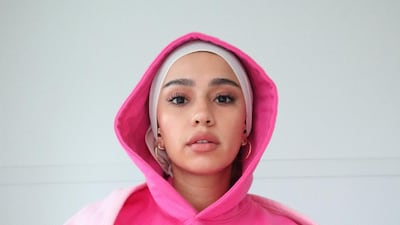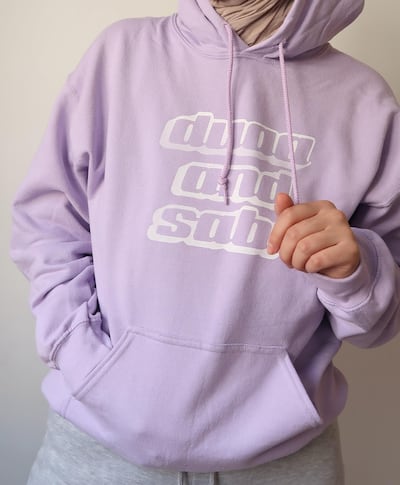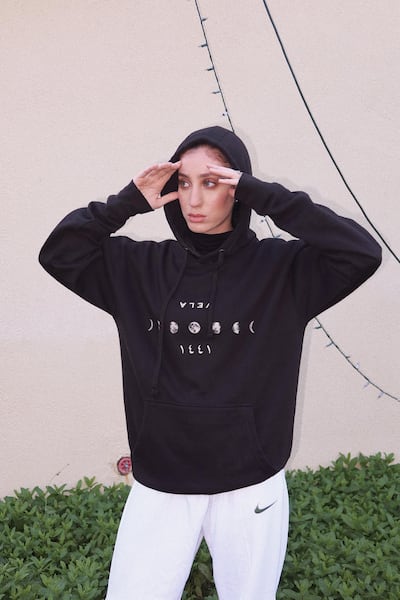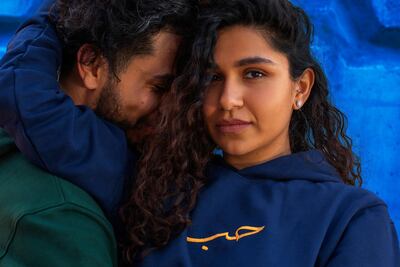Of all garments, the casual and relatively unremarkable hoodie is not traditionally one to be highlighted during the holy month of Ramadan. Embellished kaftans, decorative abayas and ornate turbans are the styles that usually come to mind for this festive period.
But worldwide, circumstances have called for a change in wardrobe requirements, and with Muslims spending Ramadan mostly confined to their homes, the hoodie has emerged as a covetable article of clothing – blending fashion with faith. So modest wear brands around the world are targeting spiritual consumers with creative and culturally tuned-in designs.
With a head cover and loose-fitting, the hoodie is a surprisingly effective modest wear option that may lack the glitz and glam of traditional Ramadan fashion, but ticks all the right boxes when it comes to comfort and practicality. Fashion and travel blogger Saira Arshad has been sporting hoodies in her recent Instagram Story videos, and says they are particularly convenient for hijabi women.
"Hoodies have been a saving grace during quarantine because you no longer have to fluff about during Zoom calls, or when the doorbell rings, as it's literally just a swoop of the hand and you're instantly covered," Arshad tells The National.
“Muslim women want to feel the comfort of being home and working from home like everyone else, without compromising their faith and values and this is an easy way to do so.”
Recognising that while socially isolating, hijabi women may not necessarily need headscarves, US brand Vela Scarves shifted gears to produce hoodies this Ramadan.
Stamped with the numbers “1441” in Arabic – which is the Islamic year we are in, some of the designs feature the different phases of the moon, symbolising the Ramadan calendar, and others feature abstract illustrations of an Arabian sunset. The brand’s name, Vela, is written upside down, “because we are living in a topsy-turvy world", states a description on the website.
“Since the hit of Covid-19, I’ll be honest, I was worried [about] how my small business would survive. When I was left to re-imagine what the new Ramadan collection would be, it was a no-brainer.
"I knew what people wanted most during these times, is comfort and adaptation to their new modesty at home,” wrote Vela co-founder and designer Marwa Atik in an Instagram post debuting the hooded designs.
The hoodie, it turns out, has become a wardrobe staple for hijabi women around the world. “I live and breathe in them,” says UK designer Zahra Khatouli. “Whether we are in isolation or not, it’s a quick way to be modest.”
Khatouli is the designer behind Touli Studio – an Islamic stationery and lifestyle brand on Etsy that specialises in journals, stickers and calendars, and this month, she has added hoodies to her e-shop. Available in on-trend shades of lilac and beige, the phrase “Dua and Sabr” (Arabic for prayer and patience) is outlined in her designs.
"I feel these words carry so much meaning whatever time we are living in. However, the message means so much more now as we are isolating and spending Ramadan at home away from our 'norm' of visiting the mosque, family, friends and loved ones," Khatouli tells The National.
“Dua and Sabr is a spiritual reminder of the kind of mindset or attitude we should have when we are put into situations like today’s.”
Uplifting messages with reminders to pray and connect with God are at the core of this current streetwear trend.
“Our main goal has always been to express positive and impactful messaging through our clothing, which is needed now more than ever,” says Ahmed Mekki, the co-founder and creative director of 5ive Pillars, an athleisure brand based between the UAE and US, and a regular exhibitor at the annual Sole DXB lifestyle fairs.
“Stay cozy at home and make 'dua' during these difficult times,” reads an Instagram caption on a photo of the brand’s bright pink hoodie embroidered with “hub", the Arabic word for love.
“We believe that love is the essence of spirituality,” says Mekki. “Love opens doors in the human heart for greater understanding, and effectively that opens doors for greater love, and there is no greater love than the love of God.
“The concept of our ‘hub’ hoodies revolves around the ultimate love between us and God, and also the love we share for his creations and each other.”
Available in tones of emerald, burgundy, peach and hot pink, the brand’s “hub” hoodies have been one of the hot-selling items over the past few weeks online. Other hooded sweatshirts are emblazoned with the words “5ive Pillars” – a brand name that is an ode to the five pillars of Islam.
“We have noticed a rise in online traffic, due to the fact that more people are spending time indoors and more time on their phones and laptops,” says Mekki. “As the world faces this pandemic in unified isolation, it brings me no shock that the demand for athleisure has skyrocketed, as people are looking for comfort now more than ever.”
It’s true that frou frou and frivolity hold little relevance when social distancing, but does this micro-trend, celebrating a garment reminiscent of disheveled teens, university students and an overall attitude of nonchalance, signal a turning point in modest fashion? Will laid-back streetwear supersede extravagance and maximalism – words that are often used to describe female modest wear styling in the Middle East?
Mekki believes that a collective need for clothing that is cosy, home-like and functional has been revived internationally, and the Muslim community is no exception.
“Comfort and practicality are two important pillars in the modest fashion industry, therefore we could be witnessing a temporary uptrend. However, the real turning point is the permanent impact this pandemic will have on consumer behaviour in the global fashion industry,” he says.
“We can expect a huge change in worldwide consumer behaviour and how they approach fashion moving forward, as they start to rethink their values and what’s important to them.”




